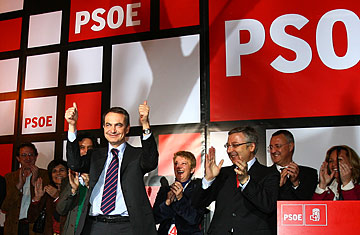
Spanish Prime Minister José Luis Rodríguez Zapatero gives a thumbs up on March 9 after winning a second term
In his victory speech Sunday night, Spain's newly re-elected socialist prime minister, José Luis Rodríguez Zapatero, spoke of unity, claiming that "Spaniards have spoken with clarity, and they have decided to open a new era — a new era without antagonism, an era that excludes confrontation, an era that looks for agreement when it comes to affairs of State." But both the campaign that preceded the election and the results themselves suggest much the opposite — that Spain will become even more polarized between right and left than it already is.
Not long after the polls closed here at 8 pm, supporters of Zapatero began dancing outside Socialist Party headquarters in Madrid. Although the official count wouldn't be released for several hours, the crowd was confident that their man had won the national elections — decisively. And indeed by 11:30pm, with roughly 90% of the ballots counted, the Socialists had won 43.87% of the vote, while the opposition Popular Party held 40.17%.
Although the Socialists stood to gain five seats in Congress over the previous legislature, they failed to win the 176 seats needed to form an absolute majority. As they did in 2004, they will have to form coalitions with the United Left party and smaller nationalist parties from Cataluña and the Basque Country. But in a sign of the sharpening divide in the country, those smaller third parties like United Left and the Catalan Republican Left lost significant numbers of seats. The 2008 elections, it turned out, were the most bi-partisan in Spanish history, with the Socialists and the Popular Party now making up 92% of the seats in Congress.
"In places like the Basque Country or Cataluña, the nationalist parties lost ground to the Socialists," says Ismael Crespo, political scientist at the University of Murcia. "That could be because the Socialists have brought their policies closer into line with nationalists, or because more nationalists in those regions abstained from voting."
For the Socialists, the victory confirms that most Spaniards support the broad, progressive social initiatives the party has made a hallmark of its government during the past four years. "This is a victory for the idea of a politics that defends dialogue, plurality, and cohesion, and that rejects antagonism," said Socialist party spokesperson José Blanco in an early victory speech.
Blanco's comment was a less-than-subtle reference to the Popular Party's strategy, over the past four years, of harshly criticizing the government on everything from its dealings with the Basque separatist group ETA to its legalization of gay marriage. Although the election of 2004 opened a deep breach between right and left in Spanish society, Spain today is even more polarized today than it was four years ago.
After members of the Basque separatist group ETA killed a former Socialist councilman on Friday, speculation also ran high that sympathy for the victim would lead to a greater turnout for the Socialists. But of a dozen voters interviewed as they left a Madrid polling place today, none said the assassination had influenced his or her vote. José López was typical: "We've lived with this problem for 30 years," the 46-year-old contractor said. "It's not going to change anything."
Popular Party voters certainly tended to stick to their party's message. "I voted for the Popular Party because Zapatero is a liar," said Eugenio Pascual, 68, echoing the word that PP leader Mariano Rajoy used repeatedly during the campaign to describe his opponent. "He lied to us about negotiating with ETA, and he'll keep lying." Others, like Daniel Nieto, a 30-year-old engineer, emphasized their concern with the economy.
Socialist voters like Alberto Pérez and Isabel Rua, both of whom work in the theater, focused on their party's social initiatives. "They haven't fulfilled all their promises, Pérez said, "But they've created greater equality for women, they've helped immigrants, they've supported gay marriage. They're a lot better than the alternative."
During the campaign, the Socialists made clear that if re-elected they would continue their progressive social agenda-including mandating equal salaries for men and women and gradually shutting down nuclear power plants. "The Spain of 2012 will be better than the Spain of 2008," promised party spokesperson Blanco after the victory. But with an emboldened opposition party standing in its way, any change will be bitterly fought, and Blanco's prediction may be hard to fulfill.
